Getting into a car accident in Sacramento can be a frightening and stressful experience, even for the most seasoned drivers. With adrenaline pumping and emotions running high, it’s easy to make missteps or forget key information that could impact any insurance claims or legal action down the road.
That’s why it’s so important to know exactly what to do after a car accident happens, step-by-step, so you can protect yourself and others involved and exercise your rights. The process is especially crucial in a large metropolitan area like Sacramento, where multi-vehicle pileups are not uncommon on crowded freeways.
While no one anticipates getting into a car accident, being prepared with the right response plan makes all the difference in achieving the best possible outcome for your unique situation. Whether it’s a minor fender bender or a major collision, this comprehensive guide will walk you through the essential next steps to take if you find yourself involved in a car accident within Sacramento city limits. Follow these tips, and you can improve safety, follow the law, gather the right documentation, streamline insurance claims, and determine if consulting a Sacramento car accident lawyer is advisable depending on fault and damages.
 Step 1: Ensure Safety First When Car Accident Happens
Step 1: Ensure Safety First When Car Accident Happens
The moments following a car accident are critical. Here’s what you need to do to ensure safety first:
Check for Injuries
- Self-Assessment: Immediately assess yourself or someone with you for car accident injuries. Be cautious; adrenaline can often mask pain or discomfort.
- Check Others: If there are passengers in your car, ask them if they are okay. Then, if it’s safe to do so, check on the occupants of the other vehicles involved.
- Call for Medical Help: If your passenger or someone is injured, dial 911 without delay. Mention the nature of the car accident injuries to ensure appropriate emergency services are dispatched.
Move to a Safe Location
- Assess Vehicle Placement: If the car accident is minor and cars are operable, California law recommends moving them to the side of the road to avoid blocking traffic.
- Use Hazard Lights: Turn on your vehicle’s hazard lights, especially if the car accident happens in a less visible area or during nighttime.
- Set Up Road Flares: If you have road flares or warning triangles, and it’s safe to set them up, do so to warn other drivers.
Ensure Personal Safety
- Stay Away from Traffic: Move to the sidewalk or another safe place away from the road. Keep a safe distance from moving traffic.
- Be Cautious of Surroundings: Watch out for broken glass or leaked fluids that might be hazardous.
Prevent Further Accidents
- Signal to Other Drivers: Use your vehicle’s lights or road safety equipment to alert incoming traffic.
- Guide Traffic if Necessary: If the car accident is blocking traffic and it’s safe, guide vehicles around the accident scene until help arrives.
Key Takeaways
When a car accident happens, your first priority should be safety. Check for injuries and call 911 if necessary, ensuring immediate medical help. Move vehicles to a safe location if possible, use hazard lights and road flares to alert other drivers, and stay away from traffic to avoid further hazards.
 Step 2: Report the Accident
Step 2: Report the Accident
Call the Police
Even for minor car accidents, it’s imperative to have an official report for legal and insurance purposes. Call the local police or highway patrol. In Sacramento, the non-emergency number is 619‑531‑2000 or 858-484-3154. For emergencies, dial 911.
Information for the Report
When the police arrive, provide them with your full name, address, date of birth, driver’s license number, vehicle registration information, and insurance details. Be prepared to explain what happened, but remember to stick to the facts without speculating or admitting fault.
Police Report
Ask the responding officer for a copy of the car accident report or the report number. This document will be important for insurance claims and any legal proceedings. In Sacramento, police reports can also be obtained later through the Sacramento Police Department’s Records Division.
Witness Statements
If there are witnesses, encourage them to stay until the police arrive so they can give statements about the car accident. Their accounts can be valuable in determining what happened.
Road Conditions and Traffic Signals
Inform the police about any relevant road conditions, such as wet roads, obscured traffic signs, or malfunctioning traffic lights. This information can be crucial in the accident investigation.
Key Takeaways
It’s essential to report the car accident by calling the police. Provide them with accurate information and obtain the police report number, which is crucial for insurance and legal purposes. Also, gather witness statements and inform the police about any significant road conditions.
 Step 3: Exchange Information and Document the Car Accident
Step 3: Exchange Information and Document the Car Accident
After ensuring everyone’s safety and reporting the accident, the next crucial step is to exchange and document information. This step is vital for insurance claims and, if necessary, legal proceedings.
Gather Essential Information from the Other Driver(s)
- Full Name and Contact Information: Make sure to get the full name, address, and contact numbers.
- Insurance Details: Ask for the name of the insurance company and the policy number.
- Driver’s License Number: Politely request to see the driver’s license and note down the license number.
- Vehicle Information: Record the make, model, color, and year of the other vehicle(s) involved.
- License Plate Number: Write down the license plate number of the other vehicle(s).
Collect Additional Information
- Witnesses: If there are witnesses, ask for their names and contact information. Witnesses can provide valuable statements that help establish the facts of the accident.
- Police Officer’s Details: Get the name, badge number, and contact information of the responding officer. Also, ask for the police report number, which you’ll need to obtain a copy of the report later.
Document the Scene
- Photographs: Take comprehensive photos of the car accident scene from various angles, capturing the positions of cars, skid marks, traffic signs, and any relevant street names or landmarks. Don’t forget to photograph the damage to all vehicles involved.
- Environmental and Road Conditions: Note any environmental conditions like rain, fog, or glaring sun that might have contributed to the accident. Also, document road conditions, such as potholes or wet surfaces.
Make Notes
- Your Account of the Accident: As soon as possible, write down your recollection of the accident. Include details like the direction you were traveling, the speed, actions you took to avoid the accident, and any other relevant information. Memories can fade, so doing this promptly ensures accuracy.
Avoid Conflict
- Stay Calm and Courteous: Emotions can run high after an accident. Stay calm and avoid arguing or discussing faults. Focus on gathering the necessary information.
- Non-Admission of Guilt: Be careful not to admit guilt or liability. Statements made at the scene can be used later in legal or insurance proceedings.
Key Takeaways
Exchange vital information with the other driver, including contact and insurance details, and document the car accident scene with photos. Collect witness information and note down environmental conditions. Avoid admitting guilt and maintain a calm demeanor throughout the process.
 Step 4: Notify Your Insurance Company
Step 4: Notify Your Insurance Company
Contact Your Insurance Company
Inform your insurance company about the car accident as soon as possible. Provide them with the information you gathered and the police report number.
Understand Your Coverage
Familiarize yourself with your insurance policy to understand what is covered. In Sacramento, policies often include coverage for medical payments, collision, and liability. Check if you have comprehensive coverage, which can be helpful if your car is damaged due to non-collision incidents like theft or natural disasters.
Discuss the Claims Process
Ask your insurance agent about the specific steps for filing a claim. This may include submitting photos of the damage, a copy of the police report, and any medical records if car accident injuries were sustained.
Inquire About a Rental Car
If your car is not drivable, ask your insurance company about rental car coverage under your policy. Many policies in Sacramento include rental reimbursement coverage, which will cover the cost of a rental car while your vehicle is being repaired.
Be Prepared for an Assessment
Your insurance company will likely send an adjuster to assess the damage to your vehicle. They will determine the extent of the damage and estimate repair costs.
Key Takeaways
Inform your insurance company as soon as possible when a car accident happens. Understand your policy coverage and discuss the claim process with your insurer. If your car is not drivable, inquire about rental coverage and prepare for an assessment by an insurance adjuster.
 Step 5: Seek Medical Attention
Step 5: Seek Medical Attention
Get Checked by a Doctor
You should see a doctor immediately after a car accident, even if you don’t think you’re injured or you think it’s not fatal. Some car accident injuries, like internal bleeding or concussions, are fatal and may not show symptoms right away. Visiting a doctor also provides a medical record of your condition, which can be important for insurance or legal purposes.
Finding Medical Assistance in Sacramento
- Urgent Care Centers: For non-life-threatening injuries, urgent care centers in Sacramento can provide prompt medical attention.
- Emergency Rooms: For more serious injuries, visit the emergency room at hospitals.
- Follow-up with Your Primary Care Physician: Even after an initial check-up at an urgent care or ER, schedule a follow-up appointment with your primary care physician. They can monitor your recovery and refer you to specialists if needed, such as chiropractors or physical therapists for whiplash or back injuries.
Document Your Injuries
- Keep all medical records and receipts related to the treatment of your injuries. This includes hospital visits, prescriptions, physical therapy, and any other related expenses.
- Take photographs of your injuries at different stages of healing.
- Maintain a journal documenting your pain levels, mobility issues, and how the injuries impact your daily life. This can be vital evidence if you pursue a car accident injury claim.
Consider a Specialist for a Detailed Evaluation
- In cases of severe injuries, you might need to see specialists. Sacramento offers various specialists, such as orthopedists, neurologists, and physical therapists. Getting a thorough evaluation can help in understanding the extent of your injuries and the projected recovery time.
Mental Health Considerations
- Don’t neglect the potential psychological impact of a car accident. Symptoms like anxiety, sleep disturbances, or PTSD are common after traumatic events. Consulting a mental health professional, such as a psychologist or counselor, is beneficial. Sacramento has numerous mental health professionals specializing in trauma and accident recovery.
Taking care of your health is a priority after a car accident. Timely and appropriate medical care not only aids in your physical recovery but also plays a crucial role in any car accident injury insurance claims or legal proceedings that may follow.
Key Takeaways
Seek medical attention immediately, regardless of whether injuries are apparent. Document all medical treatments and keep records of your injuries, including photos and notes on your recovery. Consider consulting specialists for a detailed evaluation, and don’t overlook the importance of mental health care.
 Step 6: Consider Legal Assistance
Step 6: Consider Legal Assistance
Consult a Personal Injury Lawyer
If the car accident resulted in significant injuries or there are disputes about who is at fault, it’s important to consider legal assistance. In Sacramento, personal injury lawyers specialize in car accident cases and can help navigate the complexities of insurance claims and potential lawsuits. Look for car accident attorneys who have experience with car accident cases similar to yours.
Research and Choose the Right Car Accident Attorney
Start by researching car accident lawyers in the Sacramento area. Consider their experience, client reviews, and success rates. Many law firms offer free initial consultations, so take advantage of this to discuss your case and understand their approach.
Understand Legal Fees
Most car accident attorneys in Sacramento work on a contingency fee basis, meaning they only get paid if you win your case. Ensure you understand the fee structure and any other costs that might be involved.
Gather Necessary Documentation
Prepare for your car accident lawyer consultation by gathering all relevant documents. This includes the police report, medical records and bills, photographs of the accident, witness statements, and any correspondence with insurance companies.
Discuss Your Case Thoroughly
During your car accident lawyer consultation, provide a detailed account of the accident and its aftermath. Ask your car accident lawyer about the likely outcomes of your case, the legal process, and the timeframe for settling or going to trial.
Make an Informed Decision
After consulting with potential Sacramento car accident lawyers, choose the one whom you feel most comfortable with and who you believe will best represent your interests. A good car accident attorney will offer legal representation and guidance and support throughout the process.
Key Takeaways
If the accident resulted in significant injuries or disputes, consult a personal injury lawyer. Research and choose the right car accident attorney in Sacramento, understanding their fee structures. Gather all necessary documentation for your consultation and discuss your car accident case thoroughly.
 Step 7: Follow-Up
Step 7: Follow-Up
Keep Detailed Records
Maintain a comprehensive file of all documentation related to the accident. This includes:
- Police report copy
- Exchange of information form from the other driver
- Witness statements and contact information
- Medical records and bills, including any diagnoses, treatment plans, and prescriptions
- Records of any psychological evaluations if you experienced trauma
- Documentation of time missed from work or other activities
- All correspondence with insurance companies, including claim numbers, adjuster’s name, and any settlement offers
Monitor Your Insurance Claim
Actively engage in the insurance claim process:
- Regularly check the status of your claim with your insurer.
- Keep a log of all interactions with the insurance company, noting dates, times, and a summary of conversations.
- Ensure that your insurance company has all the necessary documentation to process your claim.
Repair and Damage Assessment
For vehicle repairs:
- Obtain multiple estimates for vehicle repairs from reputable auto shops in Sacramento.
- If possible, use a repair shop that your insurance company approves or recommends.
- Keep copies of all repair estimates and final invoices.
- Photograph your vehicle’s damage before and after repairs for your records.
Seek Legal Advice If Necessary
If you encounter any issues with your insurance claim or if the other party disputes the accident details:
- Consider consulting with a Sacramento-based attorney specializing in car accidents.
- Bring all relevant documentation to your consultation for the attorney to review.
Post-Accident Health Follow-Up
Monitor your health closely following the accident:
- Follow up with your healthcare provider as recommended.
- Keep records of any ongoing symptoms or new health issues that arise post-accident.
- Inform your doctor and insurance company of any changes in your health condition.
Final Settlements
Before agreeing to any final settlements:
- Review the settlement offer thoroughly and ensure it covers all your expenses and damages.
- Consult with your car accident lawyer or a trusted advisor to ensure the settlement is fair and comprehensive.
- Understand that accepting a settlement means giving up the right to pursue further claims related to the accident.
By meticulously following these steps, you can expect that all aspects of your car accident aftermath are properly managed, protecting your rights and interests in the process.
Key Takeaways
Keep detailed records of all documents related to the accident, including medical records, insurance correspondences, and repair estimates. Actively monitor your insurance claim and follow up on repairs. Seek legal advice if necessary, especially if encountering issues with claims or disputes, and carefully consider any final settlements before agreeing.
 Conclusion
Conclusion
Getting into a car accident can be an extreme and unsettling experience. Even minor collisions result in having to deal with insurance claims, repairs, injuries, and paperwork. More serious collisions lead to much higher levels of stress and many legal complexities.
By following the step-by-step guide above, you can make sure you know exactly what to do after an accident in Sacramento. The most important thing is to ensure everyone’s safety first and get medical assistance for any injuries right away. Then, be sure to collect key information and document the scene thoroughly before reporting the incident to the police and your insurance provider.
As the dust settles, continue to actively monitor your claim, health, and any repairs or legal action needed. Keep detailed records and follow up on every loose end. If larger disputes or injuries are involved, don’t hesitate to consult an experienced personal injury attorney to protect your rights.
While no one hopes to ever be involved in a collision, accidents do happen despite our best efforts. Following these tips will help you navigate the aftermath as efficiently and effectively as possible. Staying calm, being prepared with the right information, and knowing each step to take puts you on the best path to resolving the situation. With step-by-step guidance, you can move forward from a car accident feeling empowered and protected.
Frequently Asked Questions
How do I find the best car accident attorney near me in Sacramento?
To find the best car accident attorney near you in Sacramento, you should start by researching local law firms that specialize in car accident or personal injury cases. Look for car accident attorneys with a strong track record of successfully handling similar cases, and read client reviews and testimonials to gauge their reputation and client satisfaction. It's also beneficial to check their credentials and whether they are members of relevant legal associations. You can use online legal directories, which provide ratings and reviews of car accident attorneys. Also, seeking recommendations from friends, family, or colleagues who have had similar legal needs can be invaluable. Once you have a shortlist, schedule consultations with potential car accident attorneys to discuss your case and evaluate their communication skills, expertise, and comfort level with them.
What to do if you get in a car accident in Sacramento?
If you're involved in a car crash accident in California, the first step is to ensure the safety of all parties and call 911 if there are injuries. Exchange information with the other driver, including names, contact details, and insurance information. It's also important to document the scene with photos and gather witness information, if available. Avoid admitting fault or making statements that could be interpreted as an admission of liability.
What happens if someone else is driving my car and gets in an accident?
If someone else is driving your car and gets into an accident, in most cases, your car insurance policy will cover the damages, as insurance typically follows the car, not the driver. However, this depends on the specifics of your insurance policy and the circumstances of the accident. The driver's insurance may also be involved if the damages exceed your policy's limits.
How long do you have to report a car accident to your insurance company?
The time frame to report a car accident to your insurance company varies by insurer, but it's generally recommended to do so as soon as possible, often within 24 to 72 hours after the accident. Prompt reporting helps with the efficient processing of your claim and ensures that you meet any deadlines set by your insurance policy.
What to do after a minor car accident?
After a minor car accident, ensure everyone's safety and move vehicles out of traffic if possible. Exchange information with the other driver, including names, contact details, and insurance information. Document the scene with photos and note any witnesses. Even for minor accidents, it's advisable to report the incident to the police and your insurance company.
Being sued for a car accident, what can they take?
If you're sued for a car accident and lose the case, the plaintiff can potentially claim damages, including medical expenses, lost wages, and property damage. Depending on your assets and insurance coverage, these costs might be covered by your insurance up to your policy's limits. Anything beyond that may require payment from your personal assets.
Why is my car accident settlement taking so long?
Car accident settlements can take a long time due to various factors: the complexity of the case, the extent of injuries/damages, the investigation process by insurance companies, and negotiations between involved parties. Delays can also arise if there's a dispute over fault or if additional evidence or medical records are required.
How much does a lawyer get from a car accident settlement?
A lawyer typically gets a contingency fee from a car accident settlement, which is usually between 25% to 40% of the settlement amount. This fee structure means the lawyer only gets paid if you win your case or settle, and the percentage can vary based on the case complexity and the attorney's fee agreement.
How much can someone sue for a car accident?
The amount someone can sue for in a car accident depends on the damages incurred. This can include medical expenses, property damage, lost wages, and pain and suffering. There's no set limit, as it varies based on the accident's severity, the extent of injuries, and the jurisdiction's laws.
How to settle a car accident claim without a lawyer?
To settle a car accident claim without a lawyer, gather all necessary documentation (e.g., medical records, repair bills, police reports), assess your damages accurately, and communicate directly with the insurance company. Be prepared to negotiate and understand the full extent of your entitlements. However, be cautious as this approach might result in a lower settlement than what a lawyer could negotiate.
How much money can a passenger in a car accident get?
A passenger in a car accident can receive compensation for medical expenses, lost wages, and pain and suffering. The amount depends on the accident's severity, the injuries sustained, and the insurance policies involved. Passengers are typically not at fault, so they may have claims against multiple parties.
How much does car insurance go up after an accident?
The increase in car insurance rates after an accident varies based on the insurer, your driving history, and the accident's severity. On average, rates can increase by 20% to 40%, but this can be higher for serious or at-fault accidents. Some insurers offer accident forgiveness policies that prevent your first accident from affecting your rates.
How to get a police report for a car accident?
To get a police report for a car accident, contact the law enforcement agency that responded to the accident. This could be city police, county sheriff, or state highway patrol. Provide the date, time, and location of the accident, along with any involved parties' names. There may be a fee for the report.
How long does a car accident settlement take?
The duration of a car accident settlement varies widely. It can take anywhere from a few months to several years, depending on the case's complexity, the severity of injuries, the clarity of fault, and the negotiation process. Settlements involving severe injuries or disputed liability typically take longer.
When is it too late to get a lawyer for a car accident?
In California, the statute of limitations for personal injury claims is generally two years from the date of the accident. If you're considering legal action after a car accident, it's important to consult a lawyer as soon as possible within this time frame. Waiting too long can jeopardize your ability to file a claim.
How long does it take to get settlement money from a car accident?
The time it takes to receive settlement money from a car accident varies, often depending on the complexity of the case, the extent of injuries, and the willingness of the insurance company to settle. It can take a few months to several years, but most cases are settled within 1-2 years.
What happens if an unlicensed driver has an accident with my car?
If an unlicensed driver has an accident with your car, the insurance implications depend on various factors. If they have your permission to drive, your insurance may cover the damages. However, this could lead to increased premiums or policy cancellation. If they didn’t have permission, your insurer may refuse to cover the damages.
How long after a car accident can you claim injury?
In California, you have up to two years from the date of the accident to file a personal injury lawsuit. However, it’s advisable to seek medical attention immediately after an accident and consult a lawyer soon after, as delays can affect the validity and strength of your claim.
What is the average settlement for a minor car accident?
The average settlement for a minor car accident varies widely based on the extent of damage and injuries. Settlements can range from a few thousand dollars for minor damages and injuries to much higher amounts if there are more significant injuries or substantial vehicle damage.
What happens if I'm at fault in a car accident in Sacramento?
If you're at fault in a car accident in Sacramento, your insurance company will likely cover the damages and injuries sustained by the other party, up to your policy's limits. However, this can result in increased insurance premiums, and you may be personally liable for any amounts exceeding your coverage limits.
What happens after a car accident that is your fault?
After a car accident that is your fault, you should report the accident to your insurance company. They will handle claims made by the other party and may cover the damages. You might face higher insurance premiums, and if the damages exceed your insurance coverage, you could be personally liable for the excess amount.
How long will insurance pay for a rental car after an accident?
The duration for which insurance will pay for a rental car after an accident depends on your policy and the circumstances of the accident. Typically, insurance covers rental costs until your car is repaired or until they offer a settlement if your car is totaled. It’s important to check the specifics of your policy.
How much does an accident devalue a car?
The amount by which an accident devalues a car, known as diminished value, varies. It depends on the car’s make, model, age, severity of the accident, and quality of repairs. On average, a car loses 10-25% of its pre-accident value, but this can be higher for newer or luxury vehicles.
How to prove you are not at fault in a car accident?
To prove you are not at fault in a car accident, collect evidence like photos of the scene, contact information of witnesses, and police reports. Seek legal advice, especially if the other party disputes your account. Consistent and accurate documentation is key in establishing your version of events.
How long after a car accident can injuries appear?
Some injuries from car accidents can appear immediately, while others may take days or even weeks to manifest. Common delayed injuries include whiplash, concussions, and soft tissue injuries. It’s important to seek medical attention even if you feel fine initially, as some injuries may be hidden.
How long does a car accident stay on your record?
In California, a car accident typically stays on your driving record for three years. However, the accident may impact your insurance premiums for a longer period, often around five to seven years, depending on the insurance company's policies.
How long do you have to file a claim after a car accident in Sacramento?
In California, the statute of limitations for filing a personal injury claim is generally two years from the date of the accident. For property damage claims, such as vehicle repair, the limit is three years. It’s crucial to file claims within these time frames to preserve your legal rights.
What happens if you get insurance after an accident in Sacramento?
Obtaining insurance after an accident won't cover that specific incident. Insurance policies only cover accidents that occur after the policy's effective date. Driving without insurance in California is illegal, and doing so can result in fines, license suspension, and other penalties.
What to do after a car accident is not your fault in Sacramento?
Even if the car crash accident was not your fault in California, it's important to exchange information with the other driver and report the accident to your insurance company. Gather evidence, such as photos and witness contact information. Consider filing a police report and keeping detailed records of the accident and any expenses incurred, as these can be vital for insurance claims or legal action.
What's the first thing you do when you have a car accident?
Immediately when a car accident happens, prioritize safety. Check for injuries and call emergency services if necessary. Move to a safe location if the accident is minor, and it's safe to do so. This ensures the safety of all involved and prevents further accidents or injuries.
Can I sue after a car accident in California?
Yes, you can sue after a car crash accident in California if you've suffered injuries, property damage, or other losses due to the negligence of another driver. You must file the lawsuit within the statute of limitations, which is two years for personal injury and three years for property damage. Consulting with a personal injury attorney can provide guidance on the viability of your case and the legal process.
How much compensation for a car accident in California?
The compensation for a car accident in California depends on the specifics of the case, including the severity of injuries, property damage, and other losses. Factors like medical expenses, lost wages, pain and suffering, and property repair or replacement costs are considered. There's no fixed amount, as each case is unique. The final compensation can vary greatly based on the circumstances of the accident and the extent of damages.
Is there accident forgiveness in Sacramento?
Accident forgiveness is a feature offered by some insurance companies in California, which essentially means the insurer won't increase your premiums after your first at-fault accident. However, this feature is not standard and must be part of your policy terms. It's often offered as an additional option or reward for a good driving record.
How much do car accident lawyers charge in California?
Car accident lawyers in California typically charge on a contingency fee basis, meaning they receive a percentage of the settlement or award if the case is successful. This percentage varies but is commonly around 33% to 40% of the settlement amount. Some attorneys may charge different rates or have different fee structures, so it's important to discuss fees upfront.
What is the penalty for an accident without insurance in California?
Driving without insurance and getting into an accident in California can result in severe penalties. These may include a license suspension, fines (ranging from a few hundred to thousands of dollars), and the requirement to file an SR-22 certificate of financial responsibility. Additionally, you could be held personally liable for damages and injuries you caused in the accident.
Should I get a lawyer for a car accident that wasn't my fault in California?
It is beneficial to consult a lawyer if a car accident happens and that it isn't your fault, especially if there are significant damages, injuries, or disputes about the fault. A car accident attorney can help navigate the claims process, ensure your rights are protected, and assist in seeking fair compensation.
Can I take my car to get fixed anywhere after an accident in California?
Yes, in California, you have the right to choose where to repair your vehicle after an accident. Insurance companies may suggest preferred shops, but the final decision is yours. Ensure the repair shop is reputable and provides quality service.
Is it legal to settle a car accident privately in California?
Yes, it's legal to settle a car accident privately in California. Parties involved can agree to resolve the matter without involving insurance companies. However, it's essential to document the agreement in writing, including damage payments and liability waivers. Be cautious, as private settlements can involve risks like insufficient compensation or future disputes.
Should I get a lawyer for a minor car accident in Sacramento?
For a minor car accident in California, hiring a lawyer may not always be necessary, especially if there are no injuries and minimal property damage. However, if there are any complexities, disputes about fault, or if you're facing significant financial losses, consulting a lawyer might be advisable.
Who determines fault in an auto accident in California today?
Fault in an auto accident in California is typically determined by insurance companies based on evidence like police reports, witness statements, vehicle damage, and traffic laws. In some cases, the fault may be shared among drivers under California's comparative negligence law. If there's a dispute, it can be resolved through legal proceedings.
How long does an accident affect your insurance in Sacramento?
In California, an at-fault accident can affect your car insurance premiums for about three to five years. The duration varies by insurer and the severity of the accident. During this period, premiums may be higher, reflecting the increased risk associated with the accident on your driving record.
How much do lawyers take from a settlement in Sacramento?
In California, contingency fees for personal injury lawyers typically range from 33% to 40% of the settlement amount. This percentage can vary based on the complexity of the case and the stage at which the case is resolved (pre-trial settlement vs. post-trial verdict). It's important to discuss and agree upon the fee structure with your car accident attorney before starting the legal process.
How much does a car accident lawyer cost in Sacramento County?
In Sacramento, most car accident lawyers work on a contingency fee basis, meaning they receive a percentage of the settlement or award, usually between 33% and 40%. Some may charge additional fees for specific services or expenses. It's advisable to clarify all costs and fee structures during the initial consultation.
What is the average settlement for pain and suffering in Sacramento?
The average settlement for pain and suffering in California varies widely based on factors like the severity of injuries, the impact on quality of life, and the specifics of each case. California doesn't have a set formula for calculating pain and suffering damages, so settlements can range from thousands to potentially millions of dollars, depending on the circumstances.
How much can you get for pain and suffering from a car accident in Sacramento?
Compensation for pain and suffering from a car accident in California depends on the specifics of the case, including injury severity and impact on daily life. There is no standard amount, as each case is evaluated individually. Settlements can vary significantly based on the extent of injuries and the negligence involved.
How much can you claim for pain and suffering?
The amount of money you can claim for pain and suffering varies greatly and depends on factors such as the severity of your injuries, the impact on your life, and the laws in your jurisdiction. In personal injury cases, including car accidents, there's no fixed formula for calculating these damages, so amounts can vary significantly from one case to another.
How long does it take to settle a personal injury case in Sacramento?
The time to settle a personal injury case in Sacramento varies. It can take anywhere from a few months to several years, depending on the case's complexity, the clarity of fault, the severity of injuries, and the willingness of parties to negotiate. Some cases may settle quickly, while others, especially those going to trial, can take much longer.
How much can you sue for in personal injury in Sacramento?
In California, there's no cap on economic and non-economic damages (like pain and suffering) in most personal injury cases. The amount you can sue for depends on the specifics of your case, including medical expenses, lost wages, and the severity of your injuries. However, punitive damages, if applicable, might be limited based on the defendant's ability to pay.
How much is the average car accident settlement in CA?
The average car accident settlement in California varies greatly depending on factors like the severity of injuries, property damage, and fault. Settlements can range from a few thousand dollars for minor incidents to much larger sums for serious injuries. Each case is unique, making it difficult to state an average figure.
How much do car accident lawyers charge in Sacramento?
Most car accident lawyers in California work on a contingency fee basis, typically charging between 33% and 40% of the settlement or award amount. Some might have different fee structures for cases that go to trial versus those settled out of court. Always discuss the fee arrangement with your lawyer upfront.


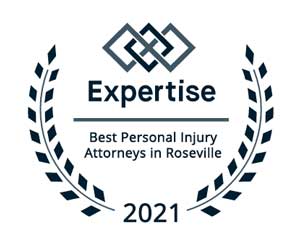
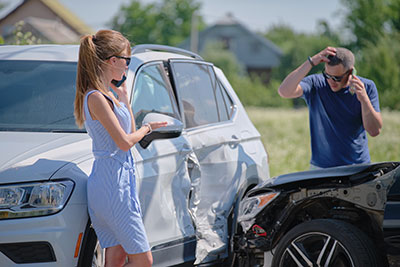 Step 2: Report the Accident
Step 2: Report the Accident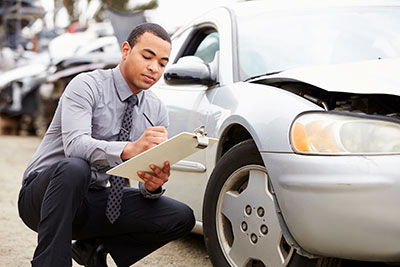 Step 3: Exchange Information and Document the Car Accident
Step 3: Exchange Information and Document the Car Accident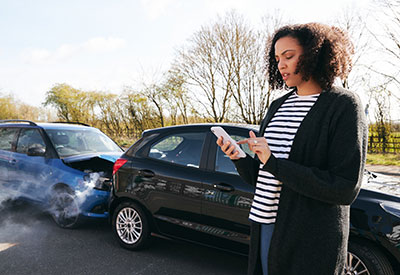 Step 4: Notify Your Insurance Company
Step 4: Notify Your Insurance Company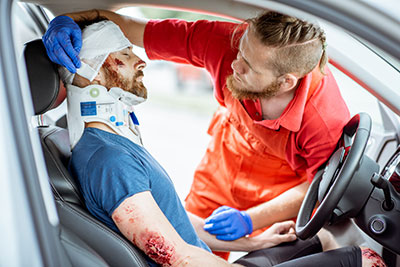 Step 5: Seek Medical Attention
Step 5: Seek Medical Attention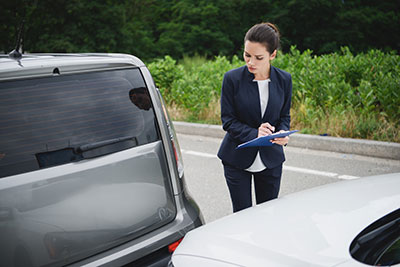 Step 6: Consider Legal Assistance
Step 6: Consider Legal Assistance Step 7: Follow-Up
Step 7: Follow-Up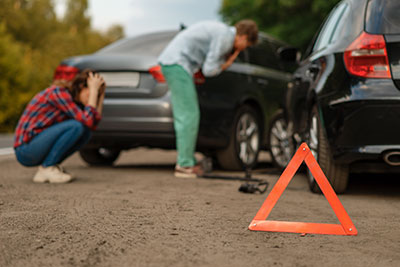 Conclusion
Conclusion